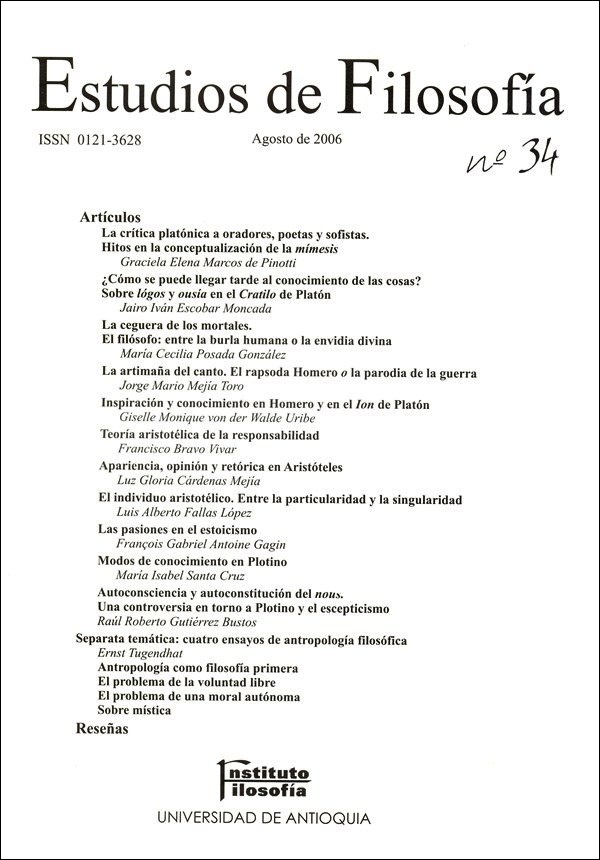How Could You Arrive Late to the Knowledge of Things? On Logos and Ousia in Plato's Cratylus
DOI:
https://doi.org/10.17533/udea.ef.12775Keywords:
Language, world, praxis, linguistics, knowledgeAbstract
I plan to discuss the Theory of Language that Plato expounds in this dialogue. His point of view tries to evade both the dangers of the Naturalist posture of Cratylus and those involved in Hermógenes' Conventionalist position, even though I believe that Plato 's position is closer to that of Hermógenes: Language as a social praxis (387c ss.) The horizon which guides his question is the epistemic relation between logos and thing (on. pragma), that is. it enables one to know the Language of Things and the World. The etymological parts of the dialogue show that making a start from the atomic word is a mistake; a detached word of a phrase does not create any connection between the language and the world. We can only know the essence of something or show its essence by means of an entwining of words, since a sentence is the least unity with meaning in language, in which we entwine words, that is, a noun and a verb. Therefore, for my reading, the passage 432dll-433al is important, in which is shown the indispensable character of logos to show what a Thing is. Another question is if the essence can be plainly shown by means of language.
Downloads
References
Böhme, Genot. (2000). Platons theoretische Philosophie. Stuugart, Weimar. MetzlerVerlag. DOI: https://doi.org/10.1007/978-3-476-05471-5
Bravo, Francisco. (2001). Estudios de Filosofía Griega. Caracas, Universidad Central de Venezuela.
Combrie, I. M. (1979). Análisis de las doctrinas de Plataón. Tomo 2. Teoría del conocimiento y de la naturaleza. Madrid. Aliama.
Escobar, Moneada Jairo. (2003). "¿Somos acaso un caballo de madera? Sobre la percepción en el Teetelo", en: Revista Latinoamericana de Filosofía. Vol. XXIX No. I
Guthrie. W. K. C. (1978). A History of Greek Philosophy. Vol V. The Plato and the Academy. Cambridge, Cambridge University Press. DOI: https://doi.org/10.1017/CBO9780511518430
Haag, Karl-Heinz. (1985). Der Forlschritt in der Philosophie. Frankfurt am Main. Suhrkamp.
Keller, Simon. (2000). An Interpretation of Plalo's Cratylus", en: Phronesis XLVI 4, 284-305. DOI: https://doi.org/10.1163/156852800510234
Kraus, Manrred. (1987). "Name und Sache. Ein Problem im frühgriechischen Denken”. Amsterdan, studien zur antiken Phifosophie 14.
Oehler, Klaus. (1998). "Platons Semiotik als Inszenierung der Ideen", en: Amicus Plato magis amica veritas. Festschrift fur Wolfgang Wieland. Berlin-New York, Walter de Gruyter, 154-170. DOI: https://doi.org/10.1515/9783110808346.154
Sallis, John. (1996). Being and Logos. Reading (the Platonic Dialogues). Bloomington and Indianapolis, Indiana University Press.
Soulez, Antonia. (1996). "Das Wesen der phônê. Die Relevanz eines phonetischen Symbolismus für eine Bedeutungslehre: Kratylos", en: Th. Kobush und B. Mojsisch (Hrsg.), Darmstadt, Wissensschaftliche Buchgesellschaft.
Szair, Jan. (2001). "Sprache, Bedeulung. Wahrheil. Oberlegungen zu Platon und seinem dialog Kratylos", en: AlIgemeine Zeiuchrift für Philosophie. Jahrgang 26, Heft 1, 45-60.
Wieland, Wolfgang. (1999). Platon und die Formen des Wissens. 2 Auf. Götinngen, Vandenhocck und Ruprecht.
Zaranka, Jouzas. (1983). Platón, Cratilo. Trad. Juozas Zaranka. Bogotá, Universidad Nacional de Colombia
Downloads
Published
How to Cite
Issue
Section
Categories
License
Copyright (c) 2006 Jairo Iván Escobar Moncada

This work is licensed under a Creative Commons Attribution-NonCommercial-ShareAlike 4.0 International License.
Authors who publish with this journal agree to the following terms:
1. The Author retains copyright in the Work, where the term "Work" shall include all digital objects that may result in subsequent electronic publication or distribution.
2. Upon acceptance of the Work, the author shall grant to the Publisher the right of first publication of the Work.
3. The Author shall grant to the Publisher a nonexclusive perpetual right and license to publish, archive, and make accessible the Work in whole or in part in all forms of media now or hereafter known under a Creative Commons Attribution-NoCommercia-ShareAlike (CC BY-NC-SA 4.0), or its equivalent, which, for the avoidance of doubt, allows others to copy, distribute, and transmit the Work under the following conditions: (a) Attribution: Other users must attribute the Work in the manner specified by the author as indicated on the journal Web site;(b) Noncommercial: Other users (including Publisher) may not use this Work for commercial purposes;
4. The Author is able to enter into separate, additional contractual arrangements for the nonexclusive distribution of the journal's published version of the Work (e.g., post it to an institutional repository or publish it in a book), as long as there is provided in the document an acknowledgement of its initial publication in this journal;
5. Authors are permitted, and Estudios de Filosofía promotes, to post online the preprint manuscript of the Work in institutional repositories or on their Websites prior to and during the submission process, as it can lead to productive exchanges, as well as earlier and greater citation of published work (see The Effect of Open Access). Any such posting made before acceptance and publication of the Work is expected be updated upon publication to include a reference to the Estudios de Filosofía's assigned URL to the Article and its final published version in Estudios de Filosofía.















